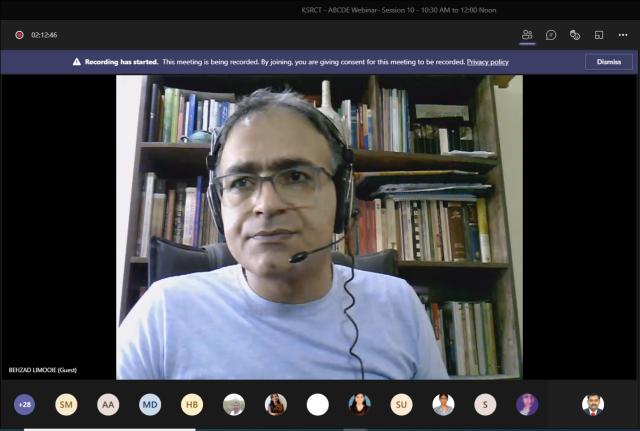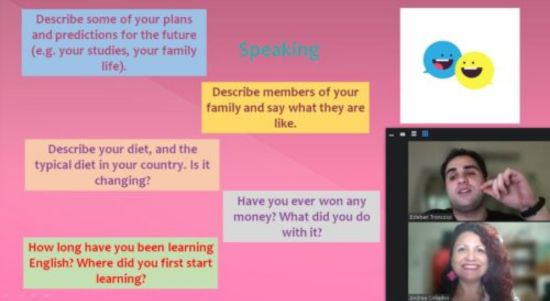Whether you want to teach in a classroom close to home, work from your home, run your own teaching business, teach abroad, or travel as a digital nomad, teaching English can help make it happen! You may be totally new to the industry and wondering, “What is teaching English as a foreign language?” or you might just need extra help exploring your options. Don’t worry! Let’s delve into what TEFL entails, how to get TEFL certified, and how you can best prepare yourself for teaching English as a foreign language.
- What is TEFL?
- What qualifications do I need to teach English as a foreign language?
- What is TEFL certification, and what is a TEFL certificate?
- How many hours of TEFL certification do I need, and how long does it take to get a TEFL certificate?
- How does online TEFL certification work?
- What jobs can I get with TEFL certification?
- What does TEFL pay?
- How do I become a TEFL teacher?
What is TEFL?
TEFL is an acronym that stands for Teaching English as a Foreign Language. Simply put, TEFL involves teaching English students in countries where English is not the first language. A TEFL teacher from South Africa, for instance, might be teaching students in Japan. Typically, the students of TEFL teachers are called EFL (English as a Foreign Language) students.
Another common umbrella term in the English teaching field is TESOL, which means Teaching English to Speakers of Other Languages. In essence, TESOL covers TEFL as well as TESL (Teaching English as a Second Language), which refers to teaching English to non-native speakers in a native-English speaking country, like the U.K.
TEFL may technically differ from TESOL in meaning, but the two terms are widely used interchangeably when it comes to English teaching and training. For instance, programs for teaching English may be called “TEFL/TESOL courses” or “TEFL/TESOL certification.” When it comes to applying for jobs, it doesn’t matter whether your professional certificate says TEFL, TESOL, or TEFL/TESOL, as long as employers see that it comes from an accredited institution. Certification can also be completed in a brick-and-mortar classroom or online.
Find out more about the differences between TEFL and TESOL.

What qualifications do I need to teach English as a foreign language?
The requirements of schools or ESL companies vary and may include a combination of the following:
-
TEFL/TESOL certification (almost always required)
-
A bachelor’s degree (often, it can be in any field)
-
Teaching experience may be preferred
-
For teaching English online, you’ll need to have the proper equipment, which typically includes a working computer, a webcam, and noise-canceling headphones.
Check out the general requirements for teaching English abroad or the requirements for teaching English online.
Kickstart your English language teaching career with
Professional TEFL/TESOL Certification
Get CertifiedWhat is TEFL certification, and what is a TEFL certificate?
Why do I need TEFL certification?
Whether you’d like to teach English abroad or online, getting a TEFL/TESOL certificate is one of the essential steps you’ll need to take. Firstly, a teaching English as a foreign language certification course provides you with the foundational knowledge and skills you need to become an English teacher. It also qualifies you for English teaching positions and establishes your credibility in the field.
How do I get a TEFL certificate?
After completing a course, you can download your free digital TEFL certificate to show to potential employers. Rarely, a country may require you to have a notarized copy of your teaching English as a foreign language certificate to be recognized or be used for visa processing.
At Bridge, you can also stack your credentials, as every time you complete a TEFL/TESOL course, your certificate will automatically be updated with the additional course hours.
How do I choose the best TEFL certification institution?
It’s not uncommon for aspiring English teachers to question which TEFL/TESOL course they should take. After all, a lot of certification courses seemingly offer the same features and benefits. So, how can you know if a TEFL/TESOL course will provide quality training and be recognized by schools and companies? Here are the most crucial factors to consider:
-
The accreditations and affiliations that your certificate carries
-
The course provider or institute’s background and track record in the market
-
The number of coursework hours
-
Course tutors’ qualifications
-
Job placement assistance the company provides
Learn more about choosing the best TEFL/TESOL certification for you.

What types of TEFL courses are there?
When you browse TEFL courses, you may also notice that there are different categories, course titles, and content. This is mainly because every course is created for a particular purpose and is designed to equip you with the skill set you need at a specific stage in your career. Let’s look at the different types of TEFL/TESOL certifications and who they’re for:
-
Professional certification. These courses are typically recommended for newcomers to the TEFL field, experienced teachers who are not yet TEFL/TESOL certified, and English teachers who want to refresh their knowledge of teaching concepts and methodologies.
-
Specialized certification. Focused on providing targeted training, these courses are best for current TEFL-certified teachers who want to develop their skills in a specific area, such as teaching English online or teaching young learners. These programs also let teachers build a teaching niche and make their resumes stand out.
-
Micro-credential courses. These bite-sized professional development courses are made for English teachers who want to explore new ideas and techniques to teach particular topics or use certain teaching strategies more effectively. For example, topics include teaching English pronunciation and teaching TOEFL test prep.
How many hours of TEFL certification do I need, and how long does it take to get a TEFL certificate?
Though TEFL/TESOL course hours vary, online and in-person English teaching jobs typically look for a professional TEFL/TESOL certification with at least 120 hours to show that you’ve received comprehensive training in the theoretical and practical aspects of English teaching.
Most TEFL/TESOL courses are also self-paced and usually have a time frame within which you’re allowed to finish the course. This is ideal because you can choose to dedicate more time to studying if you’d like to get your certificate faster! Bridge’s 120-hour Master Certificate course, for example, can be completed in up to three months, but it is possible to finish it in just six or eight weeks!
If you decide to work toward a graduate-level degree, the university-affiliated 150-hour Bridge International Diploma in English Language Teaching (IDELTOnline™) Certification allows you to earn credit toward a pathway for a master’s TESOL degree.
Learn more about how much time it takes to get TEFL/TESOL certification.
How does online TEFL certification work?
Most TEFL/TESOL courses take place online nowadays, and the vast majority of employers don’t view any difference between in-person and online certification. Flexibility is the main perk of taking an online TEFL course, as you can study at your preferred place and time!
When you enroll in one of Bridge’s online TEFL courses, you can start on the same day most of the time. The course takes place on an interactive learning platform, where you can read and even download your course materials. Aside from this, you’ll also watch videos, take quizzes, participate in discussion forums, and even interact with and get feedback from your personal tutor.
Get answers to frequently asked questions about online TEFL certification.
Launch your TEFL journey and score your dream job with our free eBook:
Teaching English as a Foreign Language
DownloadWhat jobs can I get with TEFL certification?
As a TEFL-certified teacher, a lot of work opportunities await you! Do you want to teach in a physical classroom? No problem. Do you want to become a digital nomad and travel the world while teaching English online? You can find jobs for this too!
Aside from teaching English as a foreign language, you can also embark on other ESL/EFL career paths through your TEFL certification. For example, you can become a teacher trainer, a curriculum developer, or an IELTS test examiner. You can also become a teacherpreneur and run your own ESL teaching business!
With a professional certificate, you can land teaching English as a foreign language jobs in:
-
Public schools
-
Bilingual and international schools
-
Language institutes
-
Online ESL companies
Check out these tips on landing your first TEFL job.

What does TEFL pay?
There are many types of TEFL jobs, and pay ranges can vary greatly depending on where you teach, how you teach, the requirements of the job, and your experience level. TEFL jobs like those at a university that require an advanced degree and experience will naturally pay more. Tutoring online for a marketplace will have a lower hourly wage but offer the benefits of a flexible schedule. Teachers who specialize in niche subjects like teaching English proficiency test prep can charge more, increasing pay potential.
TEFL salaries also depend on location. Keep in mind that while some countries pay higher salaries, the cost of living may also be higher. And the reverse is true as well. Some jobs also include benefits that should be factored into pay. For example, if you are teaching abroad, a job that includes a housing allowance will help your pay go a lot farther.
Let’s look at some example pay ranges.
Teaching for a public school, bilingual or international school, or language institute also has a wide range of pay impacted by your location, education level, certification, and experience. You may find jobs like these where you live or by teaching English abroad. Here are some examples of potential monthly pay in several countries:
-
Portugal: $750-$1,080
-
Spain: $1,300-$1,500
-
Thailand: $1,000-$2,000
-
South Korea: $1,700-$2,200
-
Argentina: $700-$1,500
-
Colombia: $700-$1,000
-
Qatar: $1,650-$4,500
-
Morocco: $1,000-$2,100
A typical salary for teaching English online starts at $10-$20 per hour and can increase to up to $40/hour with credentials and experience. If you are just starting out or teaching part-time, you can expect to make between $10-$15 per hour, but finding a niche and gaining experience will quickly boost your salary.
You can also start your own online English teaching business, building your own portfolio of students, choosing the courses you offer, and setting your own rates. Similar to other online English teaching jobs, you may start by offering lower hourly rates, but as your business grows and you can offer niche services, you can charge higher rates.
Interested in learning more about starting an independent online English teaching career? Learn more about training and support with Teacherpreneur Academy.
How do I become a TEFL teacher?
Getting started in English teaching is not difficult at all! Here’s how you can set up your TEFL career.
- Decide where and how you want to teach English. Do you want to teach in person or online? Would you like to begin with a company or as a freelancer?
- Get professional TEFL certification.
- Create your TEFL resume. Don’t forget to highlight your credentials and skills and include your digital badges!
- Apply to jobs. You can send your resume and other requirements directly to the company through job platforms. Depending on the employer, you may have to wait a few days before moving on to the next step of the application process.
- Start teaching!
Now that you know what TEFL and getting certified are all about, you’re already one step closer to reaching your English teaching goals! By choosing the right TEFL/TESOL certification for you, there’s no doubt that you’ll be able to teach with confidence – wherever that may be!














